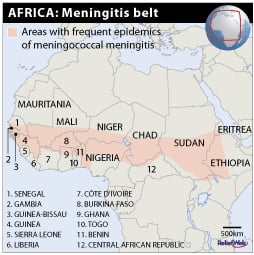Infections typically "peak" at the end of March or early April, when the disease is most widespread.
"This year pales compared to last year's outbreak," the West Africa medical expert at the European Commission Humanitarian Aid (ECHO), Amparo Laiseca, told IRIN.
In response to the 2009 outbreak, ECHO provided more than US$6 million to support meningitis vaccinations in the region. Based on the current threat, ECHO will spend about $400,000 at most this year, she said.
Below is a snapshot of the epidemic across the region.
Ghana
More than 100 people have been hospitalized with meningitis complications and another 27 have died, according to the Ministry of Health. WHO delivered 100,000 doses of meningitis vaccines on 2 March, the second delivery this year from its emergency stock of meningitis vaccine.
Prisons received 200 doses and another 300 went to security agency personnel on a peacekeeping mission in Bawku in Ghana's upper east region, a flashpoint of electoral rows, land disputes and ethnic violence.
The north, upper east and upper west of Ghana, 12 hours by car from Accra, the capital, have all reported cases.
| W135 | |
| At $1.37 per dose, the vaccine for preventing the spread of W135 costs one-third more than the vaccine used to treat the more widespread A and C strains. Because W135 is rarer, there is only one manufacturer, according to the multi-agency International Coordinating Group (ICG), which manages an emergency stock of meningitis vaccines. ICG has 2.7 million doses of the W135 vaccine, but 6.3 million of the meningitis A and C vaccines. After a seven-year absence, W135 reappeared in the region in 2009, contributing to one of the largest epidemics in the past decade. |
|
Burkina Faso
On 12 March the Ministry of Health said there had been 2,188 reported cases and 336 deaths, and the 15-percent fatality rate had not changed in the past month. Health Minister Seydou Bouda said the situation was "under control", and after vaccination campaigns the five most recently affected of the country’s 65 districts were no longer in epidemic phase (10 infections per 100,000 residents).
Benin
WHO representative Léon Kohossi told IRIN that in the central Benin towns of Tanguiéta and Bassila the pneumococcal meningitis bacteria had led to a number of deaths. Overall, the country has had 104 reported infections and 16 deaths - mostly from the more common "A" meningitis strain - as of 28 February. Benin has not yet introduced the pneumococcal vaccine.
Subsidized mass roll-outs of pneumococcal vaccine have taken place only in Rwanda and the Gambia, starting in 2009. The Global Alliance for Vaccines and Immunisation (GAVI) has estimated that this vaccine could save the lives of seven million children globally over the next two decades.
To qualify for GAVI support for this vaccine – which brings down the price from the retail cost for low-income countries of $7 to just $0.15 per dose - income-eligible countries must give at least half of all newborns the third dose of the diphtheria, pertussis (whooping cough) and tetanus (DTP3) vaccine.
Niger
The recently formed post-coup government is drafting a response plan. As of 28 February, 425 infections and 34 deaths have been reported.
Nigeria
Alejandro Javier Costa, of ICG, said Nigeria's request for vaccines from the emergency meningitis vaccine stock was being reviewed. As of 21 February, 565 infections and 55 deaths have been reported.
Togo
The country has experienced one of the region's highest fatality rates - as of 28 February there have been 188 infections and 49 deaths - but the data is hard to interpret as it may be incomplete, according to ECHO's Laiseca. "Health workers often do not have any means to communicate the information to a central level. It is possible not all infections were recorded [which would decrease the fatality rate.] "
pt/bo/em/gc/he
This article was produced by IRIN News while it was part of the United Nations Office for the Coordination of Humanitarian Affairs. Please send queries on copyright or liability to the UN. For more information: https://shop.un.org/rights-permissions





